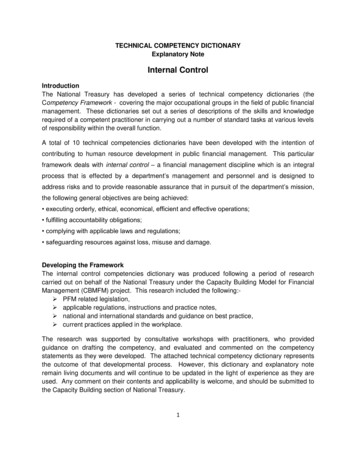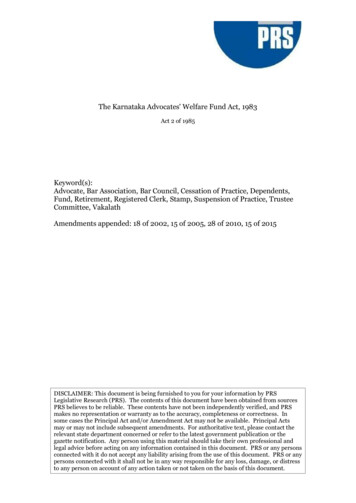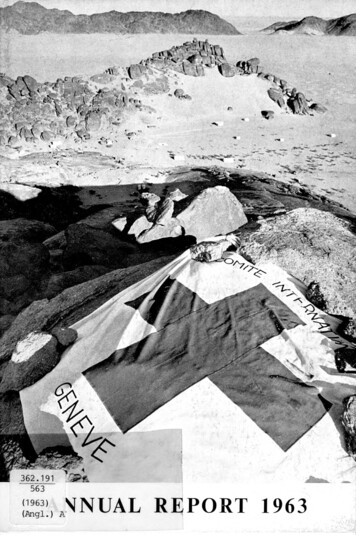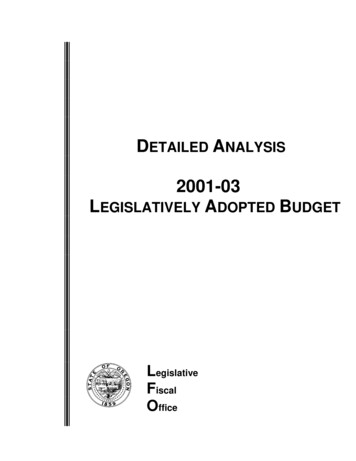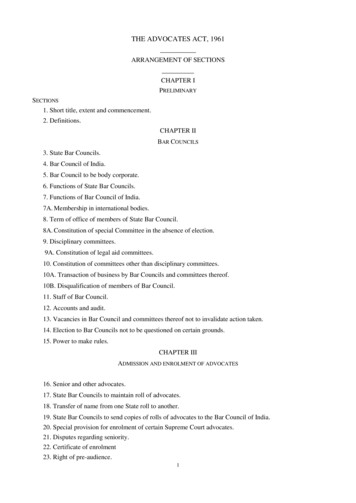
Transcription
THE ADVOCATES ACT, 1961ARRANGEMENT OF SECTIONSCHAPTER IPRELIMINARYSECTIONS1. Short title, extent and commencement.2. Definitions.CHAPTER IIBAR COUNCILS3. State Bar Councils.4. Bar Council of India.5. Bar Council to be body corporate.6. Functions of State Bar Councils.7. Functions of Bar Council of India.7A. Membership in international bodies.8. Term of office of members of State Bar Council.8A. Constitution of special Committee in the absence of election.9. Disciplinary committees.9A. Constitution of legal aid committees.10. Constitution of committees other than disciplinary committees.10A. Transaction of business by Bar Councils and committees thereof.10B. Disqualification of members of Bar Council.11. Staff of Bar Council.12. Accounts and audit.13. Vacancies in Bar Council and committees thereof not to invalidate action taken.14. Election to Bar Councils not to be questioned on certain grounds.15. Power to make rules.CHAPTER IIIADMISSION AND ENROLMENT OF ADVOCATES16. Senior and other advocates.17. State Bar Councils to maintain roll of advocates.18. Transfer of name from one State roll to another.19. State Bar Councils to send copies of rolls of advocates to the Bar Council of India.20. Special provision for enrolment of certain Supreme Court advocates.21. Disputes regarding seniority.22. Certificate of enrolment23. Right of pre-audience.1
SECTIONS24. Persons who may be admitted as advocates on a State roll.24A. Disqualification for enrolment.25. Authority to whom applications for enrolment may be made.26. Disposal of applications for admission as an advocate.26A. Power to remove names from roll.27. Application once refused not to be entertained by another Bar Council except in certain circumstances.28. Power to make rules.CHAPTER IVRIGHT TO PRACTISE29. Advocates to be the only recognised class of persons entitled to practise law.30. Right of advocates to practise.31. [Repealed.]32. Power of court to permit appearances in particular cases.33. Advocates alone entitled to practise.34. Power of High Courts to make rules.CHAPTER VCONDUCT OF ADVOCATES35. Punishment of advocates for misconduct.36. Disciplinary powers of Bar Council of India.36A. Changes in constitution of disciplinary committees.36B. Disposal of disciplinary proceedings.37. Appeal to the Bar Council of India.38. Appeal to the Supreme Court.39. Application of sections 5 and 12 of Limitation Act, 1963.40. Stay of order.41. Alteration in roll of advocates.42. Powers of disciplinary committee.42A. Powers of Bar Council of India and other committees.43. Cost of proceedings before a disciplinary committees.44. Review of orders by disciplinary committee.CHAPTER VIMISCELLANEOUS45. Penalty for persons illegally practising in courts and before other authorities.46. [Repealed.]46A. Financial assistance to State Bar Council.47. Reciprocity.48. Indemnity against legal proceedings.48A. Power of revision.48AA. Review.2
SECTIONS48B. Power to give directions.49. General power of the Bar Council of India to make rules.49A. Power of Central Government to make rules.50. Repeal of certain enactments.51. Rule of construction.52. Saving.CHAPTER VIITEMPORARY AND TRANSITIONAL PROVISIONS53. Elections to first State Bar Council.54. Term of office of members of first State Bar Councils.55. Rights of certain existing legal practitioners not affected.56. Dissolution of existing Bar Councils.57. Power to make rules pending the constitution of a Bar Council.58. Special provisions during the transitional period.58A. Special provisions with respect to certain advocates.58AA. Special provisions in relation to the Union territory of Pondicherry58AB. Special provisions with respect to certain persons enrolled by Mysore State Bar Council.58AC. Special provisions with respect to certain persons enrolled by Uttar Pradesh State Bar Council.58AD. Special provisions with respect to certain persons migrating to India.58AE. Special provisions in relation to the Union territory of Goa, Daman and Diu.58AF. Special provisions in relation to Jammu and Kashmir.58AG. Special provisions in relation to articled clerks.58B. Special provision relating to certain disciplinary proceedings.59. Removal of difficulties.60. Power of Central Government to make rules.THE SCHEDULE.3
THE ADVOCATES ACT, 1961ACT NO. 25 OF 1961[19th May, 1961.]An Act to amend and consolidate the law relating to the legal practitioners and to provide for theconstitution of Bar Councils and an All-India Bar.BE it enacted by Parliament in the Twelfth Year of the Republic of India as follows:―CHAPTER IPRELIMINARY1. Short title, extent and commencement.―(1) This Act may be called the Advocates Act, 1961.1[(2) It extends to the whole of India.](3) It 2[shall, in relation to the territories other than those referred to in sub-section (4), come into force]on such date3 as the Central Government may, by notification in the Official Gazette, appoint, and differentdates3 may be appointed for different provisions of this Act.4[(4) This Act shall, in relation to the State of Jammu and Kashmir5 and the Union territory of Goa,Daman and Diu, come into force on such date as the Central Government may, by notification in the OfficialGazette, appoint in this behalf, and different dates may be appointed for different provisions of this Act.]2. Definitions.―6[(1)] In this Act, unless the context otherwise requires,―1. Subs. by Act 60 of 1973, s. 2, for sub-section (2) (w.e.f. 31-1-1974).2. Subs. by s. 2, ibid., for “shall come into force” (w.e.f. 31-1-1974).3. The provisions of the Act have been brought into force as under:―16th August, 1961, vide notification No. S.O. 1870, dated 7th September, 1961, in respect of Chapter I , II and VII, see Gazette ofIndia, Extraordinary, Part II, sec. 3(ii).1st December, 1961, vide notification No. S.O. 2790, dated 24th November, 1961, in respect of Chapter III and s. 50(2), seeGazette of India, Extraordinary, Part II, sec. 3(ii).15th December, 1961, vide notification No. S.O. 2919, dated 13th December, 1961, in respect of s. 50(1), see Gazette of India,Extraordinary, Part II, sec. 3(ii).24th January, 1962, vide notification No. S.O. 297, dated 24th January 1962, in respect of ss. 51 and 52, see Gazette of India,Extraordinary, Part II, sec. 3(ii).29th March, 1962, vide notification No. S.O. 958, dated 29th March 1962, in respect of s. 46, see Gazette of India, Extraordinary,Part II, sec. (ii).4th January, 1963, vide notification No. S.O. 50, dated 4th January 1963, in respect of s. 32 and Chapter VI [except s. 46,sub-sections (1) and (2) of s. 50, ss. 51 and 52], see Gazette of India, Extraordinary, Part II, sec. 3(ii).1st September, 1963, vide notification No. S.O. 2509, dated 31st August, 1963, in respect of Chapter V, see Gazette of India,Extraordinary, Part II, sec. 3(ii).10th June, 1968, vide notification No. S.O. 63, dated 7th June 1968, in respect of Chapters I, II, III, section 32 of Chapter IV andChapters V, VI, VII and VIII in the Union territory of Pondicherry, see Gazette of India, Extraordinary, Part II, sec. 3(ii).1st June, 1969, vide notification No. S.O. 1500, dated 5th April, 1969, in respect of ss. 29, 31, 33 and 34 of Chapter IV, seeGazette of India, Extraordinary, Part II, sec. 3(ii).1st June, 1979, vide notification No. G.S.R. 84(E), dated 21st February 1979, except section 30 in respect of the Union territoryof Goa, Daman and Diu, see Gazette of India, Extraordinary, Part II, sec. 3(i).15th June, 2011, vide notification No. S.O. 1349(E), dated 9th June, 2011, in respect of section 30, see Gazette of India,Extraordinary, Part II, sec. 3(i).4. Ins. by Act 60 of 1973, s. 2 (w.e.f. 31-1-1974).5. 1st August 1986, vide notification No. G.S.R. 946 (E), dated 15th July 1986, except section 30, in respect of the State of Jammu andKashmir.6. Section 2 renumbered as sub-section (1) of that section by Act 60 of 1973, s. 3 (w.e.f. 31-1-1974).4
(a) “advocate” means an advocate entered in any roll under the provisions of this Act;(b) “appointed day”, in relation to any provision of this Act, means the day on which that provision comes intoforce;1*****(d) “Bar Council” means a Bar Council constituted under this Act;(e) “Bar Council of India” means the Bar Council constituted under section 4 for the territories to which this Actextends;2*****(g) “High Court”, except in sub-section (1) 3[and sub-section (1A)] of section 34 and in sections 42 and 43, doesnot include a court of the Judicial Commissioner, and, in relation to a State Bar Council, means,-(i) in the case of a Bar Council constituted for a State or for a State and one or more Union territories, theHigh Court for the State;(ii) in the case of the Bar Council constituted for Delhi, 4[the High Court of Delhi];(h) “law graduate” means a person who has obtained a bachelor's degree in law from any University establishedby law in India;(i) “legal practitioner” means an advocate 5[or vakil] of any High Court, a pleader, mukhtar or revenue agent;(j) “prescribed” means prescribed by rules made under this Act;(k) “roll” means a roll of advocates prepared and maintained under this Act;(l) “State” does not include a Union territory;(m) “State Bar Council” means a Bar Council constituted under section 3;(n) “State roll” means a roll of advocates prepared and maintained by a State Bar Council under section 17.3[(2) Any reference in this Act to a law which is not in force in the State of Jammu and Kashmir or in the Unionterritory of Goa, Daman and Diu, shall, in relation to that State or that territory, be construed as a reference to thecorresponding law, if any, in force in that State or that territory, as the case may be.]CHAPTER IIBAR COUNCILS3. State Bar Councils.―(1) There shall be a Bar Council—(a) for each of the States of Andhra Pradesh, Bihar, Gujarat, 6[Jammu and Kashmir,] 7[Jharkhand], 8[MadhyaPradesh and Chhattisgarh], 9***, 10***, 11[Karnataka], Orissa, Rajasthan 12[Uttar Pradesh, 13[Uttaranchal, Meghalya,Manipur and Tripura], to be known as the Bar Council of that State;1. Clause (c) omitted by Act 107 of 1976, s. 2 (w.e.f. 15-10-1976).2. Clause (f) omitted by Act 60 of 1973, s. 3 (w.e.f. 31-1-1974).3. Ins. by s. 3, ibid. (w.e.f. 31-1-1974).4. Subs. by s. 3, ibid., for “the High Court of Punjab” (w.e.f. 31- 1-1974).5. Subs. by Act 107 of 1976, s. 2, for “vakil or attorney” (w.e.f. 15-10-1976).6. Ins. by Act 60 of 1973, s. 4 (w.e.f. 31-1-1974).7. Ins. by Act 30 of 2000, s. 28 (w.e.f. 15-11-2000).8. Subs. by Act 28 of 2000, s.24, for “and Madhya Pradesh” (w.e.f. 1-11-2000).9. The word “Madras” omitted by Act 26 of 1968, s. 3 and Sch. 4.10. The word “Maharashtra” omitted by Reg. 8 of 1963, s. 12 (w.e.f. 1-7-1965).11. Subs. by the Mysore State (Alteration of Name) (Adaptation of Laws on Union Subjects) Order, 1974, for “Mysore”(w.e.f. 1-11-1973).12. Subs. by Act 29 of 2000, s. 29, for “and Uttar Pradesh” (w.e.f. 9-11-2000).13. Subs. by Act 26 of 2012, s. 9, for “and Uttaranchal” (w.e.f. 23-3-2013).5
1[(b) for the States of Arunachal Pradesh, Assam, Mizoram and Nagaland to be known as the BarCouncil of Arunachal Pradesh, Assam, Mizoram and Nagaland;](c) for the State of Kerala and the Union territory of 2[Lakshadweep] to be known as the Bar Councilof Kerala;3[(cc) for the 4[State of Tamil Nadu] and the Union territory of Pondicherry to be known as the BarCouncil of Madras;]5[(ccc) for the States of Maharashtra and Goa and the Union territories of Dadra and Nagar Haveli andand Daman and Diu, to be known as the Bar Council of Maharashtra and Goa;]6[(d) for the States of Punjab and Haryana and the Union territory of Chandigarh, to be known as theBar Council of Punjab and Haryana;(dd) for the State of Himachal Pradesh, to be known as the Bar Council of Himachal Pradesh;](e) for the State of West Bengal and the 7[Union territory of Andaman and Nicobar Islands], to beknown as the Bar Council of West Bengal; and(f) for the Union territory of Delhi, to be known as the Bar Council of Delhi.(2) A State Bar Council shall consist of the following members, namely:―(a) in the case of the State Bar Council of Delhi, the Additional Solicitor-General of India, ex officio;[ [in the case of the State Bar Councils of Assam, Arunachal Pradesh, Mizoram and Nagaland, theAdvocate-General of each of the States of Assam, Arunachal Pradesh , Mizoram and Nagaland] ex officio;in the case of the State Bar Council of Punjab and Haryana, the Advocate-General of each of the States ofPunjab and Haryana, ex officio;] and in the case of any other State Bar Council, the Advocate-General ofthe State, ex officio;8 910[(b) in the case of a State Bar Council with an electorate not exceeding five thousand, fifteenmembers, in the case of a State Bar Council with an electorate exceeding five thousand but not exceedingten thousand, twenty members, and in the case of a State Bar Council with an electorate exceeding tenthousand, twenty-five members, elected in accordance with the system of proportional representation bymeans of the single transferable vote from amongst advocates on the electoral roll of the State BarCouncil:]11[Provided that as nearly as possible one-half of such elected members shall, subject to any rules thatmay be made in this behalf by the Bar Council of India, be persons who have for at least ten years beenadvocates on a State roll, and in computing the said period of ten years in relation to any such person,there shall be included any period during which the person has been an advocate enrolled under the IndianBar Councils Act, 1926 (38 of 1926).]1. Subs. by Acts 26 of 2012, s. 9, for clause (b) (w.e.f .23-3-2013).2. Subs. by the Laccadive, Minicoy and Amindivi Islands (Alteration of Name) Act, 1973 (34 of 1973), s. 5, for “the Laccadive,Minicoy and Amindivi Islands” (w.e.f. 1-11-1973).3. Ins. by Act 26 of 1968, s. 3 and the Sch.4. Subs. by the Madras State (Alteration of Name) (Adaptation of Laws on Union Subjects) Order, 1970, for “State of Madras”(w.e.f. 14- 1-1969).5. Subs. by Act 18 of 1987, s. 21, for clause (ccc) (w.e.f. 30-5-1987).6. Subs. by Act 53 of 1970, s. 24, for clause (d) (w.e.f. 25-1-1971).7. Subs. by Act 81 of 1971, s. 34, for “Union territories of Tripura and the Andaman and Nicobar Islands” (w.e.f. 21-1-1972).8. Ins. by Act 60 of 1973, s. 4 (w.e.f. 31-1-1974).9. Subs. by Act 26 of 2012, s. 9, for “in the case of the State Bar Council of Assam, Nagaland, Meghalaya, Manipur and Tripura, theAdvocate-General of each of the States of Assam, Manipur, Meghalaya, Nagaland and Tripura” (w.e.f. 23-3-2013).10. Subs. by Act 60 of 1973, s. 4, for clause (b) (w.e.f. 31-1-1974).11. Ins. by Act 21 of 1964, s. 2 (w.e.f. 16-5-1964).6
1[(3) There shall be a Chairman and a Vice-Chairman of each State Bar Council elected by the Council insuch manner as may be prescribed.(3A) Every person holding office as Chairman or as Vice-Chairman of any State Bar Council immediatelybefore the commencement of the Advocates (Amendment) Act, 1977 (38 of 1977), shall, on suchcommencement, cease to hold office as Chairman or Vice-Chairman, as the case may be:Provided that every such person shall continue to carry on the duties of his office until the Chairman orthe Vice-Chairman, as the case may be, of each State Bar Council, elected after the commencement of theAdvocates (Amendment) Act, 1977 (38 of 1977), assumes charges of the office.]1[(4) An advocate shall be disqualified from voting at an election under sub-section (2) or for beingchosen as, and for being, a member of a State Bar Council, unless he possesses such qualifications or satisfiessuch conditions as may be prescribed in this behalf by the Bar Council of India, and subject to any such rulesthat may be made, an electoral roll shall be prepared and revised from time to time by each State Bar Council.(5) Nothing in the proviso to sub-section (2) shall affect the term of office of any member elected beforethe commencement of the Advocates (Amendment) Act, 1964 (21 of 1964), but every election after suchcommencement shall be held in accordance with the provisions of the rules made by the Bar Council of Indiato give effect to the said proviso.]2[(6) Nothing in clause (b) of sub-section (2) shall affect the representation of elected members in anyState Bar Council as constituted immediately before the commencement of the Advocates (Amendment) Act,1973 (60 of 1973), until that State Bar Council is reconstituted in accordance with the provisions of this Act.]4. Bar Council of India.―(1) There shall be a Bar Council for the territories to which this Act extends tobe known as the Bar Council of India which shall consist of the following members, namely:―(a) the Attorney-General of India, ex officio;(b) the Solicitor-General of India, ex officio;3*****(c) one member elected by each State Bar Council from amongst its members.4[(1A) No person shall be eligible for being elected as a member of the Bar Council of India unless hepossesses the qualifications specified in the proviso to sub-section (2) of section 3.]5[(2) There shall be a Chairman and a Vice-Chairman of the Bar Council of India elected by the Councilin such manner as may be prescribed.(2A) A person holding office as Chairman or as Vice-Chairman of the Bar Council of India immediatelybefore the commencement of the Advocates (Amendment) Act, 1977 (38 of 1977), shall, on suchcommencement, cease to hold office as Chairman or Vice-Chairman, as the case may be:Provided that such person shall continue to carry on the duties of his office until the Chairman or theVice-Chairman, as the case may be, of the Council, elected after the commencement of the Advocates(Amendment) Act, 1977 (38 of 1977), assumes charge of the office.]1. Subs. by Act 38 of 1977, s. 2, for sub-sections (3) and (3A) (w.e.f. 31-10-1977).2. Ins. by Act 60 of 1973, s. 4 (w.e.f. 31-1-1974).3. Clause (bb) omitted by Act 38 of 1977, s. 3 (w.e.f. 31-10-1977).4. Ins. by Act 60 of 1973, s. 5 (w.e.f. 31-1-1974).5. Subs. by Act 38 of 1977, s. 3, for sub-sections (2) and (2A) (w.e.f. 31-10-1977).7
1[(3) The term of office of a member of the Bar Council of India elected by the State Bar Council shall,—(i) in the case of a member of a State Bar Council who holds office ex officio, be two years from thedate of his election 2[or till he ceases to be a member of the State Bar Council, whichever is earlier]; and(ii) in any other case, be for the period for which he holds office as a member of the State BarCouncil:Provided that every such member shall continue to hold office as a member of the Bar Council of Indiauntil his successor is elected.]5. Bar Council to be body corporate.―Every Bar Council shall be a body corporate having perpetualsuccession and a common seal, with power to acquire and hold property, both movable and immovable, and tocontract, and may be the name by which it is known sue and be sued.6. Functions of State Bar Councils.―(1) The functions of a State Bar Council shall be―(a) to admit persons as advocates on its roll;(b) to prepare and maintain such roll;(c) to entertain and determine cases of misconduct against advocates on its roll;(d) to safeguard the rights, privileges and interests of advocates on its roll;3[(dd) to promote the growth of Bar Associations for the purposes of effective implementation of thewelfare schemes referred to in clause (a) of sub-section (2) of this section and clause (a) of sub-section (2)of section 7;](e) to promote and support law reform;4[(ee) to conduct seminars and organise talks on legal topics by eminent jurists and publish journalsand papers of legal interest;(eee) to organise legal aid to the poor in the prescribed manner;](f) to manage and invest the funds of the Bar Council;(g) to provide for the election of its members;3[(gg) to visit and inspect Universities in accordance with the directions given under clause (i) ofsub-section (1) of section 7;](h) to perform all other functions conferred on it by or under this Act;(i) to do all other things necessary for discharging the aforesaid functions.5[(2) A State Bar Council may constitute one or more funds in the prescribed manner for the purpose of—of—(a) giving financial assistance to organise welfare schemes for the indigent, disabled or otheradvocates;(b) giving legal aid or advice in accordance with the rules made in this behalf;3[(c) establishing law libraries.]1. Ins. by Act 21 of 1964, s. 3 (w.e.f. 16-5-1964).2. Ins. by Act 60 of 1973, s. 5 (w.e.f. 31-1-1974).3. Ins. by Act 70 of 1993, s. 2 (w.e.f. 26-12-1993).4. Ins. by Act 60 of 1973, s. 6 (w.e.f. 31-1-1974).5. Subs. by s. 6, ibid., for sub-section (2) (w.e.f. 31-1-1974).8
(3) A State Bar Council may receive any grants, donations, gifts or benefactions for all or any of thepurposes specified in sub-section (2) which shall be credited to the appropriate fund or funds constituted underthat sub-section.]7. Functions of Bar Council of India.― 1[(1)] The functions of the Bar Council of India shall be―2*****(b) to lay down standards of professional conduct and etiquette for advocates;(c) to lay down the procedure to be followed by its disciplinary committee and the disciplinarycommittee of each State Bar Council;(d) to safeguard the rights, privileges and interests of advocates;(e) to promote and support law reform;(f) to deal with and dispose of any matter arising under this Act, which may be referred to it by a StateBar Council;(g) to exercise general supervision and control over State Bar Councils;(h) to promote legal education and to lay down standards of such education in consultation with theUniversities in India imparting such education and the State Bar Councils;(i) to recognise Universities whose degree in law shall be a qualification for enrolment as an advocateand for that purpose to visit and inspect Universities 3[or cause the State Bar Councils to visit and inspectUniversities in accordance with such directions as it may give in this behalf];4[(ia) to conduct seminars and organise talks on legal topics by eminent jurists and publish journalsand papers of legal interest;(ib) to organise legal aid to the poor in the prescribed manner;(ic) to recognise on a reciprocal basis foreign qualifications in law obtained outside India for thepurpose of admission as an advocate under this Act;](j) to manage and invest the funds of the Bar Council;(k) to provide for the election of its members;(l) to perform all other functions conferred on it by or under this Act;(m) to do all other things necessary for discharging the aforesaid functions.4[(2) The Bar Council of India may constitute one or more funds in the prescribed manner for the purposeof—(a) giving financial assistance to organise welfare schemes for indigent, disabled or other advocates;(b) giving legal aid or advice in accordance with the rules made in this behalf.5[(c) establishing law libraries.](3) The Bar Council of India may receive any grants, donations, gifts or benefactions for all or any of thepurposes specified in sub-section (2) which shall be credited to the appropriate fund or funds constituted underthat sub-section.]1. Section 7 re-numbered as sub-section (1) of that section by Act 60 of 1973, s. 7 (w.e.f. 31-1-1974).2. Clause (a) omitted by s. 7, ibid. (w.e.f. 31-1-1974).3. Added by Act 70 of 1993, s. 3 (w.e.f. 26-12-1993).4. Ins. by Act 60 of 1973, s. 7 (w.e.f. 31-1-1974).5. Ins. by Act 70 of 1993, s. 3 (w.e.f. 26-12-1993).9
1[7A. Membership in international bodies.―The Bar Council of India may become a member ofinternational legal bodies such as the International Bar Association or the International Legal Aid Association,contribute such sums as it thinks fit to such bodies by way of subscription or otherwise and authoriseexpenditure on the participation of its representatives in any international legal conference or seminar.]2[8. Term of office of members of State Bar Council.―The term of office of an elected member of aState Bar Council (other than an elected member thereof referred to in section 54) shall be five years from thedate of publication of the result of his election:Provided that where a State Bar Council fails to provide for the election of its members before the expiryof the said term, the Bar Council of India may, by order, for reasons to be recorded in writing, extend the saidterm for a period not exceeding six months.8A. Constitution of Special Committee in the absence of election.―(1) Where a State Bar Council failsto provide for the election of its members before the expiry of the term of five years or the extended term, asthe case may be, referred to in section 8, the Bar Council of India shall, on and from the date immediatelyfollowing the day of such expiry, constitute a Special Committee consisting of―(i) the ex officio member of the State Bar Council referred to in clause (a) of sub-section (2) ofsection 3 to be the Chairman:Provided that where there are more than one ex officio members, the senior most amongst them shallbe the Chairman; and(ii) two members to be nominated by the Bar Council of India from amongst advocates on theelectoral roll of the State Bar Council,to discharge the functions of the State Bar Council until the Bar Council is constituted under this Act.(2) On the constitution of the Special Committee and until the State Bar Council is constituted—(a) all properties and assets vesting in the State Bar Council shall vest in the Special Committee;(b) all rights, liabilities and obligations of the State Bar Council, whether arising out of any contract orotherwise, shall be the rights, liabilities and obligations of the Special Committee;(c) all proceedings pending before the State Bar Council in respect of any disciplinary matter orotherwise shall stand transferred to the Special Committee.(3) The Special Committee constituted under sub-section (1) shall, in accordance with such directions asthe Bar Council of India may give to it in this behalf, hold elections to the State Bar Council within a period ofsix months from the date of its constitution under sub-section (1), and where, for any reason the SpecialCommittee is not in a position to conduct election within the said period of six months, the Bar Council ofIndia may, for reasons to be recorded by it in writing, extend the said period.]3[9. Disciplinary committees.―(1) A Bar Council shall constitute one or more disciplinary committees,each of which shall consist of three persons of whom two shall be persons elected by the Council fromamongst its members and the other shall be a person co-opted by the Council from amongst advocates whopossess the qualifications specified in the proviso to sub-section (2) of section 3 and who are not members ofthe Council, and the senior-most advocate amongst the members of a disciplinary committee shall be theChairman thereof.(2) Notwithstanding anything contained in sub-section (1), any disciplinary committee constituted prior tothe commencement of the Advocates (Amendment) Act, 1964 (21 of 1964) may dispose of the proceedingspending before it as if this section had not been amended by the said Act.]1. Ins. by Act 60 of 1973, s. 8 (w.e.f. 31-1-1974).2. Subs. by Act 70 of 1993, s. 4, for section 8 (w.e.f. 26-12-1993).3. Subs. by Act 21 of 1964, s. 5, for section 9 (w.e.f. 16-5-1964).10
1[9A. Constitution of legal aid committees.―(1) A Bar Council may constitute one or more legal aidcommittees each of which shall consist of such number of members, not exceeding nine but not less than five,as may be prescribed.(2) The qualifications, the method of selection and the term of office of the members of a legal aidcommittee shall be such as may be prescribed.]10. Constitution of committees other than disciplinary committees.―(1) A State Bar Council shallconstitute the following standing committees, namely:―(a) an executive committee consisting of five members elected by the Council from amongst itsmembers;(b) an enrolment committee consisting of three members elected by the Council from amongst itsmembers.(2) The Bar Council of India shall constitute the following standing committees, namely:―(a) an executive committee consisting of nine members elected by the Council from amongst itsmembers;(b) a legal education committee consisting of ten members, of whom five shall be persons elected bythe Council from amongst its members and five shall be persons co- opted by the Council who are notmembers thereof.(3) A State Bar Council and the Bar Council of India may constitute from amongst its members such othercommittees as it may deem necessary for the purpose of carrying out the provisions of this Act.2[10A. Transaction of business by Bar Councils and committees thereof.―3[(1) The Bar Council ofIndia shall meet at New Delhi or at such other place as it may, for reasons to be recorded in writing,determine.(2) A State Bar Council shall meet at its headquarters or at such other place as it may, for reasons to berecorded in writing, determine.](3) The committees other than disciplinary committees constituted by the Bar Councils shall meet at theheadquarters of the respective Bar Councils.(4) Every Bar Council and every committee thereof except the disciplinary committees shall observe suchrules of procedure in regard to the transaction of business at their meetings as may be prescribed.(5) The disciplinary committees constituted under section 9 shall meet at such times and places and shallobserve such rules of procedure in regard to the transaction of business at their meetings as may beprescribed.]4 5[ [10B.] Disqualification of members of Bar Council.―An elected member of a Bar Council shall bedeemed to have vacated his office if he is declared by the Bar Council of which he is a member to have beenabsent without sufficient excuse from three consecutive meetings of such Council, or if his name is, for anycause, removed from the roll of advocates or if he is otherwise disqualified under any rule made by the BarCouncil of India.]1. Ins. by Act 60 of 1973, s. 9 (
THE ADVOCATES ACT, 1961 _ ARRANGEMENT OF SECTIONS _ CHAPTER I PRELIMINARY SECTIONS 1. Short title, extent and commencement. 2. Definitions. CHAPTER II BAR COUNCILS 3. State Bar Councils. 4. Bar Council of India. 5. Bar Council to be body corporate. 6. Functions of State Bar Councils. 7. Functions of Bar Council of India. 7A. Membership in international bodies. 8. Term of office of .



